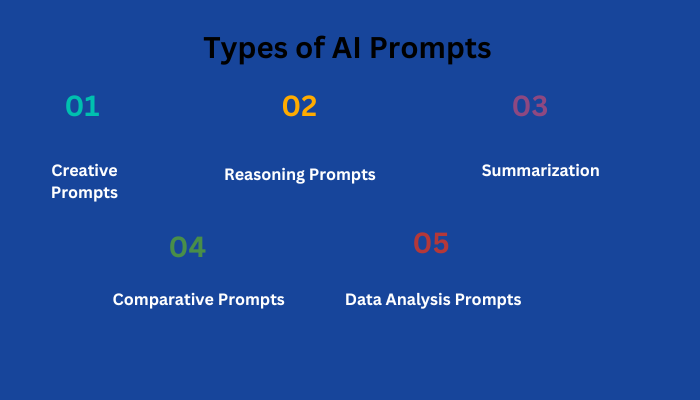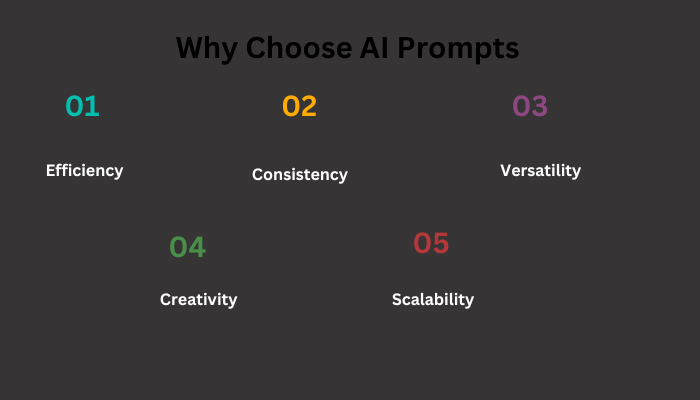Learn about Why Choose AI Prompts. Learn about AI prompts, their types, and their benefits. Explore how they improve efficiency, creativity, decision-making, and productivity in various industries, enhancing user experience and saving time.
Introduction
A prompt is an input given to an artificial intelligence model, for instance, a language model, to bring up some result or response. Prompts are such inputs where an AI formulates its outputs-relevant content in text, images, or any other media in the context. AI prompts create responses ranging from one-word answers to well-elaborated imaginative outputs in natural language processing (NLP).
The effect of prompt quality and specificity is obvious in the output qualities of an AI input text. AI-friendly prompts sample applications such as content generation, answering questions, performing task-related equations, and much more.
Types of AI Prompts
Creative Prompts
Using creative prompts, AI is provoked to generate something innovative and imaginative. Examples include writing and producing poetry to ideating in art and design. Through such prompts, AI has managed to demonstrate its creativity by probing different possibilities under certain themes or genres.

Reasoning Prompts
Reasoning prompts are for testing the problem-solving abilities of the A.I. These usually require at the end of the day that the A.I. analyzes a situation logically, or computes solutions to complex problems. Most times, these include those scenarios that really could test critical thinking and the decision-making ability of AII.
Summarization
The instruct summarization of AI is to shorten a longer piece of content to something that is more easily digestible. Summary-type prompts are possibly useful for quickly pulling together the main points of articles, reports, portions, or even entire books while retaining much of the meaning behind them.
Comparative Prompts
Comparative prompts ask the AI to compare two or more items, concepts, or ideas. The highlight is on the similarities, differences, or advantages and disadvantages. This will enable insightful analysis and evaluation. These are mostly common with reviews and assessments.
Data Analysis Prompts
Data analysis is a prompt given to AI, which means that the Robot will scrutinize and interpret data, often to identify trends, patterns, or outliers. This type of prompt is used mostly in research, business analytics, and scientific studies to turn large data sets into actionable insights for users.
Benefits of effective AI prompts
Accurate Responses
The well-formed AI prompts help one in generating more accurate and relevant responses. The instructions strongly suggest the AI generate the answer expected on the query with less room for error and better quality content or solutions in the generation.
Enhanced Performance
A well-structured and formulated prompt will assist in maximizing the efficiency of the AI in generating more specific, accurate, and context-relevant response types. The-again AI in such instances will be able to perform better when analyzing complex tasks with richer output quality, resulting in a better-interactive experience for users.
Better User Experience
Perfectly crafted prompts enhance AI performance in providing not only detailed but accurate and context-based responses. This, indeed, makes AI performance very efficient when handling extremely complex tasks, thereby improving the quality of output and interaction it continues proportionated’s user experience.
Enhanced Decision-making and Productivity
AI prompts help speed up the process of narrowing down possible options for decision-making via specific data analysis. Users, therefore, can make decisions much quicker through targeted insights, thus improving productivity in total. Boosting efficiency and speeding up the workflow is possibly focusing attention on more relevant information as opposed to irrelevant ones.
Enhanced Creativity
These prompts incite the creativity of the AI, which can lead to brilliant new ideas or solutions in a practical sense- to missions they had not thought were important. They allow the AI to try out all types of different creative epiphanies-from unique, audience-specific tales to new, conceptual artwork or even brilliant new product ideas.
Time Savings
Effective prompts usually save time because they lead the AI to generate pertinent and useful responses as fast as possible. Because of this, a user will not have to go through rounds of repetitions or clarification, thereby allowing the user to be quick in completing tasks whether they produce content or otherwise.
Why Choose AI Prompts
1. Efficiency
It enables an immediate generation of suggestions which is a lifesaver for prompt content creation efforts. Users do not bother brainstorming hours for ideas but fix their mentality mostly on the execution of their work. This can hasten the process without compromising quality and is perfect for busy professionals and content creators.
2. Consistency
Contrary to creating multiple contents that lack similarity in tone, style, and quality, AI ensures that it remains the same. The main beneficiaries are businesses, marketers, and educators: those who need their message to be uniform in any context blog posts marketing campaigns, and even lesson plans.
3. Versatility
AI prompts can be customized to address the specific needs of various industries, such as marketing, creative writing, and research. Whether you are drafting a social media post, writing a product description, or preparing an academic research project, these prompts can cater to all your content needs.
4. Creativity
AI can provide a new angle from which fresh ideas can come. This can help users in finding new directions in their writing, projects, or problem-solving styles. Whether it is neat brainstorming or some other unique angle, AI prompts can be invaluable when it comes to sparking creativity.
5. Scalability
AI has enabled the very rapid generation of prompts, which makes it rather easy for companies, bloggers, or content agencies to crank out multiple pieces of content in no time at all. AI’s scalability would go on to make demand content production possible all without any quality drawbacks.

The Importance of AI Prompts
The performance of any AI model will depend on the prompt given. A good prompt will increase the quality of responses given by the AI, while vague or poorly designed ones would render irrelevant or incomplete answers.
AI models like GPT (Generative Pre-trained Transformer) are dependent on the clarity and specificity of their prompts for understanding the task they have to perform. It is possible to guide the AI to generate more accurate and meaningful responses by customizing the prompt to feature specific instructions or context within the prompt.
How AI Prompts Work
The way AI prompts work is by conferring the specific context necessary to bring about or undertake the task by the AI. AI models like GPT are trained on large datasets that contain examples of human languages in several contexts.
When a user inputs a specific prompt, then the AI model leverages the training to appropriately predict the response, Then, the model analyzes the prompt for keywords, context, and structure, with the intent of generating an output that aligns with the request.
The effectiveness of an AI prompt depends on its clarity, specificity, and relevance to the intended task. In some cases, the AI may require multiple iterations of prompts to refine its responses, especially in more complex or nuanced tasks.
Challenges with AI Prompts
Even though these AI prompts are very helpful at some point but still these AI prompts had their problems. Biased AI answers one major issue. Since AI is trained on a huge database that contains information that mostly does not encompass all of them, it can produce outputs that are in line with bias. Users should know such limitations and scrutinize the response of these AIs.
Another challenge is that even though AI is very sophisticated, it cannot understand some of the subtleties of human language; sarcasm, humor, and some ambiguities may lead the AI into misinterpretation and, therefore, irrelevant or incorrect answers.
Conclusion
AI prompts are indeed powerful tools in human-machine interaction, which guide them in generating the specific, relevant, and inventive content they have trained for. Its key to using the AI prompts most efficiently would be clarity and precision because providing proper context and structure would yield a more accurate and meaningful response. AI prompts would continue becoming increasingly important as AI technology matured across sectors such as content creation, customer service, education, and research, to name a few.






